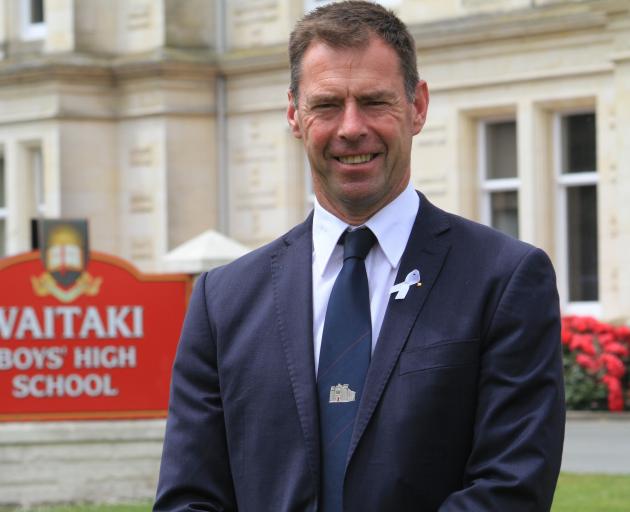
When rector Darryl Paterson was appointed late last year, he was expected to be the man to guide the Oamaru high school back to its former level of esteem. Hamish MacLean checks in.
The most important reason to come to school is to learn - and in his first year in the role Waitaki Boys' High School rector Darryl Paterson says he has learned a lot.
Mr Paterson, the former deputy rector at Dunedin's King's High School, started the school year in January, back in his hometown of Oamaru as the first permanently appointed rector of Waitaki Boys' since a commissioner took over.
Mr Paterson, an old boy, said he was pleased with a lot of what he had seen at Waitaki Boys' this year: he wanted the school to continue to focus on its positive culture; and he was hopeful that by this time next year the school would again be governed by a board of trustees.
Though academic achievement was ''central'' to everything at the school - and he was pleased the school's roll would likely increase next year - it was the school's culture he focused on as a measure of success.
''What have I learned this year? To be patient. That change takes time. I know I'm an impulsive person so I see things that need to change and I want to get stuck into them straight away. Sometimes you've just got to back off and let things evolve.
''My job is not done for a long while yet,'' Mr Paterson said.
''I want to keep moving the culture.
''Our mindset this year was about the power of the word 'yet'. We're doing better at everything, but we're not quite there 'yet'.
''Most boys are engaged in extracurricular activities; or most boys are participating in sports; or most boys are achieving their best academically - but we're trying to get them all. And that's the challenge. The culture is moving in a positive way, but we want to get it to where all the boys exhibit school values.''
Boys at the school were there for different academic reasons and getting boys engaged in the right academic path for them had also been an important culture shift.
One-third of the boys would go on to university; one-third would enter polytechnics and apprenticeships, and one-third would head straight out into the workforce into ''jobs mainly around farming and building''.
Of those who were keen to get on a vocational pathway, and get work experience under the belt, most had gone off to meaningful employment whereas previously they could have suffered through a ''mainstream'' class.
''Those boys have achieved their academic potential, just the same as the boy who is achieving [NCEA] level 3 excellences.
''That's been the biggest change, that shift in taking their studies seriously.''
Mr Paterson said he expected ''particularly with [NCEA] level one and two we're going to be well above the national average this year'' when last year the school's boys were ''well below''.
''That's the easy part,'' Mr Paterson said. ''The hard part is getting the cream to rise to the top. But we think our endorsements will be at a similar level or slightly above what we were last year.''
A Ministry of Education spokeswoman confirmed the Oamaru high school was the the smallest boys' state school in New Zealand.
And Mr Paterson said while the roll would increase next year, the following year it could ''drop back a bit''.
There were 442 pupils who started the current year and next year would be ''slightly above that'', with 106 year 9 pupils coming in. The high school started this year with just 80 year 9 pupils.
Next year the school would also undergo a departmental review with staff putting ''a real lens'' on the curriculum.
Mr Paterson enjoyed working with school commissioner Craig Smith but returning the school to a normal governance model under a board of trustees was also a matter of public pride.
The morale of the staff was ''outstanding'', the boys had as much pride in being at the school as ever, and the boys were engaged.
''I'm even more engaged now, positive now, than I was at the start of the year,'' Mr Paterson said. ''I thought the school had a lot of potential then and now I think it's got even more.''












